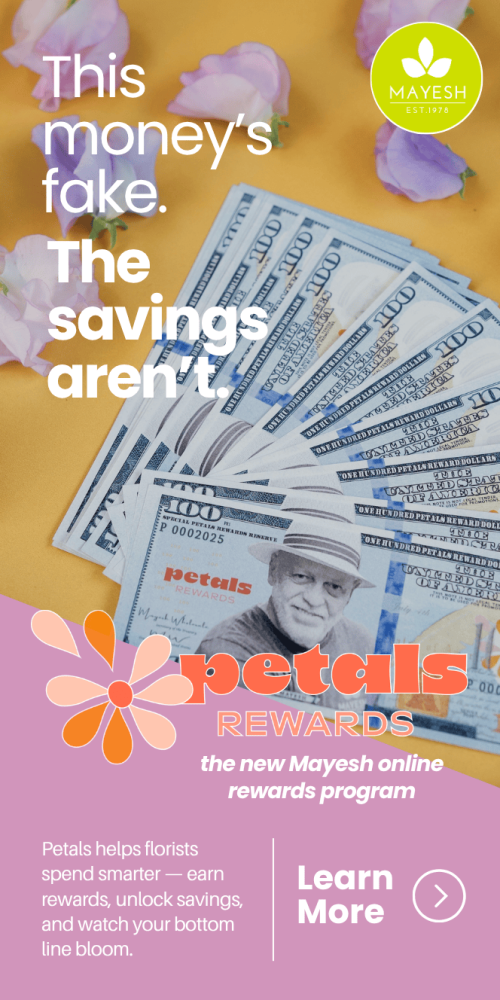Stories of Nurturing Mental Health in America
By Nita Robertson, AIFD
In the hustle and bustle of modern American life, mental health is an increasingly prevalent concern. Stress, anxiety and depression affect millions of individuals, impacting their daily lives and overall well-being. According to the National Alliance on Mental Illness (NAMI), approximately one in five adults in the United States experiences mental illness each year. As society grapples with these issues, exploring alternative avenues for mental health support becomes imperative. One such avenue, often overlooked, lies in the simple beauty of flowers.
Nature has emerged as a powerful antidote to the stresses of modern life. According to behavioral research conducted at Rutgers, The State University of New Jersey, exposure to nature, even in small doses, can have profound effects on mental health. In fact, it can be said that in today’s increasingly urbanized world, maintaining a connection to nature is essential for mental health. From reducing stress and anxiety levels to fostering relaxation and improving mood and cognitive function, nature offers a plethora of benefits for psychological well-being.
Within the realm of nature, flowers are powerful agents of therapeutic benefit. Their presence holds immense potential for transforming environments into havens of healing, serving as a catalyst for promoting mental wellness and enriching lives with enhanced quality and vitality. Their vibrant colors, delicate petals and enchanting fragrances evoke feelings of happiness, serenity and tranquility, and they serve as a reminder of the natural world, bridging the gap between humans and the environment. Whether adorning indoor sanctuaries or gracing outdoor landscapes, integrating flowers into spaces ranging from homes to healthcare facilities create peaceful atmospheres that promotes relaxation, restoration and emotional sustenance.

Flower arranging, in particular, offers therapeutic and enriching experiences—especially for individuals dealing with mental health challenges—that can positively impact mental health by promoting creativity, a connection to nature and social interaction while also providing opportunities for artistic expression and emotional exploration. Creating flower arrangements can stimulate the imagination, promote problem-solving skills and foster a sense of accomplishment, all of which can contribute to improved mental well-being.
By recognizing the therapeutic potential of flowers and incorporating them into mental health initiatives, programs, and support networks, we can harness the healing power of the products we work with every day to promote emotional well-being and resilience in individuals and communities across America.
Some florists, like Yoli LaGuerre, AIFD, EMC, owner of Yoli LaGuerre Fine Flowers in Basalt, Colo., are already championing this cause, offering floral classes that provide much-needed support and healing to people who need it. Yoli started the nonprofit foundation We Are Perennials, which offers floral design workshops as a form of creative therapy to victims of domestic violence and those struggling with addiction. We Are Perennials states as its mission, “Assisting those who struggle from a fractured life to restore, reclaim and rebuild through the power of nature, flowers and art.”

LaGuerre founded We Are Perennials in February 2022 while on bed rest from a skiing injury, bringing to life a concept she had envisioned eight years earlier. Drawing on her talents and personal experiences with domestic violence and depression, she aimed to serve those struggling with similar issues. However, teaching floral design alone was not enough. Yoli knew she needed to equip herself with the skills and knowledge to work with people in crisis. She undertook several trainings, including crisis intervention, to responsibly and effectively help the individuals she aimed to serve.
Once We Are Perennials obtained its 501(c)(3) status, LaGuerre began doing the hands-on work she had prepared for. In November 2022, We Are Perennials partnered with several mental health organizations, domestic violence shelters, and substance and alcohol rehabilitation centers in Colorado. LaGuerre’s crisis training immediately proved invaluable. The participants were in various states of distress—dealing with shame, fear, anxiety and depression. Admittedly, LaGuerre was nervous. Starting an organization that is the first of its kind, with the deepest desire to be successful and make a positive impact, was a daunting task.
After conducting several on-location floral design workshops, she began to witness firsthand the positive impact that floral design can have on people suffering. “Seeing the smiles on their faces and the light in their eyes as they create something beautiful has been incredibly rewarding,” she shares. It has reaffirmed her belief in the power of botanical creative therapy as a tool for healing and recovery.

“Once finished creating their flower arrangements, participants have a tangible sense of achievement. The pride in their eyes is beautiful and, instantaneously, they come out of their shells, begin to socialize, and share each other’s designs.” This also reaffirms that the program works and she must keep going. “Participants are left with a profound sense of accomplishment and a therapeutic outlet for their emotions. Designing with flowers helps them find moments of peace and beauty in their otherwise tumultuous lives, and the creative process allows them to express themselves in a safe and supportive environment.”
We Are Perennials workshops have also sparked an interest in the floral design trade among many participants. Through the organization’s continuing-education scholarships, they have the opportunity to learn skills not only in floral design but now also gardening and landscaping that could lead to financial independence, freeing them from the burden of relying on government subsidies. Through the workshops, they discover how working in the horticulture industry can positively impact their lives.
In an exciting development, We Are Perennials is now on a national tour, providing free workshops at rehabilitation centers and domestic violence shelters throughout America. “This expansion allows us to reach even more individuals who can benefit from the therapeutic effects of floral design, gardening and landscaping,” LaGuerre enthuses.

As a forerunner in the field, Laguerre is committed to growing the trend in botanical creative therapy. It is her mission to bring joy and peace to those struggling with depression by working with flowers and plants, helping them find solace, build resilience and experience moments of happiness during their recovery journey.
As We Are Perennials continues to grow, LaGuerre is also expanding the organization’s reach to help even more individuals find solace and strength through floral design and horticulture. Soon, she will be recruiting people to become certified We Are Perennials instructors and teach workshops in their home states. With each workshop, participants are proud to declare that they are “Perennials” and will grow stronger with each passing season.
Another florist, Jelena Trifunovic, founder and CEO of Viola Floral, a floral design and teaching studio in Santa Monica, Calif., offers in-person floral design workshops that focus on the mental health benefits of flowers. “Our flower arranging workshops help attendees practice mindfulness and self-love with flowers, hone their creativity and build something beautiful to remind them to live in full bloom,” Trifunovic explains.

After her mother passed away from pancreatic cancer in 2016, Trifunovic decided to pursue her passion for flowers by launching her business in 2019. Viola Floral began as a labor of love and a path for Jelena to heal, but now, Jelena leads a team of designers who share her passion for flowers and floral design education. Using her firsthand experience with grief, she wants to help others heal through flowers.

“Flower arranging is a beautiful and rewarding hobby that connects one to nature,” Trifunovic says. “When people are arranging flowers, I tell them to go deeper by reflecting on this connection and that by practicing such mindfulness, they will lower their anxiety and stress levels and find joy. Mindfulness is the practice of paying attention to the present moment without judgment and entering a state of flow when doing an activity. Combining mindfulness with the calming effects of flowers creates a powerful tool for self-care. The presence of flowers triggers a release of dopamine, serotonin and oxytocin in the human brain. These chemicals are released not only when giving and receiving flowers but also when arranging and caring for flowers.”
In the journey toward mental wellness, exploring alternative forms of support is essential. Flowers, with their innate beauty and therapeutic properties, offer a unique avenue for nurturing mental health in America. By incorporating flowers into daily life and embracing the healing power of nature, individuals can find solace amid life’s challenges and embark on a path toward greater emotional well-being.
As a florist, educate your customers on the mental health benefits of flowers. Consider offering design classes in your area to help people experience these benefits firsthand and learn how to incorporate the calming presence of flowers into their daily routines.























